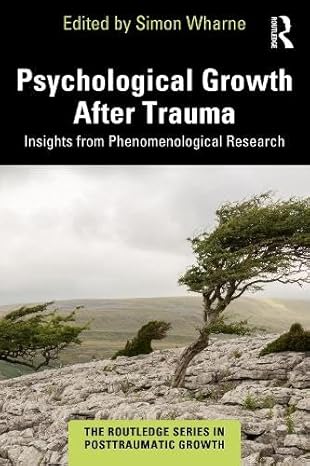This title is due to be published on the 21st August 2025. You can if you wish, order it now at our special pre-publication price and we will deliver it to you as soon as it becomes available.
Psychological Growth After Trauma is a guide to moving away from assumptions about trauma as a simple form of ‘psychological damage.’ Each chapter promotes an understanding of difficult experiences as learning opportunities that help us attune to the reality of existence and become more at ease with the truths that trigger our anxieties. The book holds close to a phenomenological stance in which understanding emerges through experience and reflection. This is not a book that argues for a model that practitioners would be required to adopt and impose on their clients. Instead, Psychological Growth After Trauma brings insights and explorations together, allowing the reader to build their own framework for understanding.
This book is divided into sections, starting with the experiences of women, then early life trauma, encountering death, the aftermath of colonialism, political conflict and war, and trauma as it emerges in the therapeutic encounter.
Emmy van Deurzen provides a foreword, and there is also a foreword written by the series editors, Richard Tedeschi and Bret A. Moore.
The contents are:
1. Introduction – Simon Wharne
2. Birth Trauma and Existential Crisis: How Becoming a Mother Involves a Confrontation with Existence – Claire Arnold-Baker
3. Experiences of Women Living Beyond Rape and Interpersonal Violence – Natalie Fraser
4. Emerging from Adolescent Sexual Grooming: The Need for Truth – Amy Bramley
5. The Co-Existence of Posttraumatic Stress and Posttraumatic Growth Related to Childhood Trauma – April Mangion
6. Living with Traumatic Bereavement – Chloe Paidoussis-Mitchell
7. Surviving Near Death Following Cardiac Arrest – Tania D’aloia
8. Lived Experiences of Antiblack Racism: Is the Impact Always a Permanent Psychological Scar or Can There Be Growth? – Jackie Sewell
9. Political Refugees: Rising Above Trauma – Armin Danesh
10. The Impact of Active Military Service on Intimate Relationships: Trauma, Breakdown, and Breakthrough – Susan Iacovou
11. Trauma: The Search for a Poisoned Chalice? – Niklas Serning
12. Applying a Hermeneutic Phenomenological Lens: A Literary Review Observes the Impact of Client Suicide on the Therapist – Mary Spring
13. Carrying the Torch of Hope: An Investigation into the Experiences of Shared Interpersonal Trauma in the Therapeutic Relationship – Polina Lukanova
14. Vicarious Trauma and Growth in Mental Health Workers – Simon Wharne
15. Trauma and Existence: Existential-Humanistic Understandings of Trauma, with Existential-Analytic and Phenomenological Implications for Practice – Marc Boaz
These chapters report on phenomenological studies and the findings support the use of existential / phenomenological approaches in counselling and psychotherapy. In these approaches, there is a move away from assumptions about trauma as a simple form of ‘psychological damage.’ The book promotes an understanding of difficult experiences as learning opportunities that help us attune to the reality of existence and to become more at ease with the truths that trigger our anxieties. In this sense, traumatic experiences are not something to get over or put behind us. They are impactful in the way they reveal our vulnerabilities and our mortality. They ask us to re-evaluate the approach that we are taking in living our lives.
The book holds close to phenomenological research methods, in which understanding emerges through experience and reflection. This is not a book that argues for a model that practitioners would be required to adopt and impose on all their clients. The authors of each chapter work to reveal the details of how different traumas are experienced. It is evident, when attending to those details, that the meanings we attach to these experiences will make a significant difference to how we respond. There is a wide range of traumatic experiences, and differences between them are highly significant. Some are hidden, some insidious, others constitute a pivotal intrusion into a person’s sense of themselves. Some drive a person into isolation or denial, others unite people in shared meanings and motivations.
A challenging experience can be highly traumatic for one person, while it will be an exciting encounter with adversity for another, or just the way things are for someone else. Purposeful rumination is identified as an important in the attainment of growth. This kind of reflection enables a person to take a stance towards their suffering. A stance that provides them with meaning and purpose. A stance that they choose through their own volition.
The research reported in the book Psychological Growth After Trauma, reveals that adversity can be endured when a person shares understandings and purpose with others, when they are emotionally connected within their community. They can then respond to the traumas they endure with authenticity, with purposeful rumination, to establish a positive stance in solidarity with others. When, that is, they attain a degree of spirituality, reaching beyond the limits of their lifespan.
In the rationality of psychological sciences, it might be suggested that symptoms associated with trauma come about through random processes of cause and effect, with no inherent meaning. Many clients can find this to be an inadequate explanation. Existential and phenomenological approaches are open to exploring the meaning and significance of traumatic experiences in a deeper and more human centred manner.

